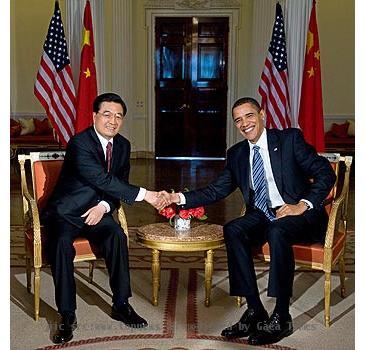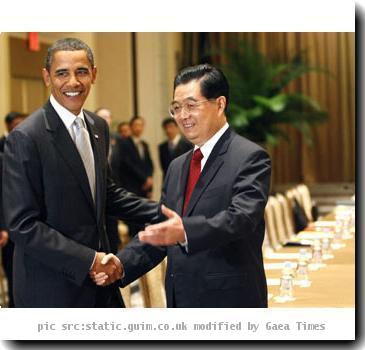China, Taiwan sign trade deal further linking their economies 6 decades since split
By Alexa Olesen, APTuesday, June 29, 2010
China, Taiwan sign trade pact linking economies
BEIJING — A historic trade deal between China and Taiwan will ease 60 years of hostility and push their economies closer than ever, the latest sign that Beijing’s strategy of wooing the self-ruled island with carrots instead of sticks is paying off.
At the signing of the deal in the Chinese city of Chonqquing on Tuesday, negotiators on both sides spoke of a new era in ties across the Taiwan Strait — where the threat of military conflict has lingered since Taiwan and China split amid civil war in 1949.
Bilateral trade already totals $110 billion annually, and the pact aims to boost it further by slashing tariffs on a wide range of products. Taiwanese businesses are among the most eager to invest on the mainland, which the pact will promote by formalizing mechanisms for dispute mediation and promising access to new sectors such as banking and insurance.
“This is a critical moment in the development of long-term relations. We should seize the opportunity to work together and build mutual trust,” Chiang Pin-kung, chairman of Taiwan’s semiofficial Straits Exchange Foundation, said ahead of the signing.
His Beijing counterpart, Chen Yunlin, called it an agreement of “equal consultation and mutual benefits.”
The nuts and bolts of the pact, formally known as the Economic Cooperation Framework Agreement, resemble a deal China hammered out recently with a bloc of trade partners in Southeast Asia, but with added political resonance. It reflects Beijing’s commitment to improving ties with Taiwan and signals a softening of the mainland’s stance toward the island of 23 million.
Chinese President Hu Jintao has sought to move beyond the threatening rhetoric that long characterized Beijing’s response to Taiwan’s refusal to unify with the mainland. His government has talked of ending the state of hostility with Taiwan and negotiating a peace treaty.
“For Taiwan, this is purely an economic deal, while for China, this is a political move,” said Kao Huei at the National Kinmen Institute of Technology in Taiwan. “Mainland China now sees cross-strait relations at a stage of peaceful development, and the signing of ECFA fits into that narrative. In the long term, what China wants to achieve with peaceful development is peaceful unification with Taiwan.”
For decades, relations have been strained and the 100-mile- (160-kilometer-) wide Taiwan Strait remains a potential military flash point. China has 1,300 missiles aimed at Taiwanese targets and, while Taiwan has cut its defense budget as a proportion of GDP in the last two years, it retains a relatively well-equipped air force.
But in the last two years, the sides have tried to build trust by resuming regular air and sea links after a hiatus of 60 years and ending across-the-board restrictions on Chinese investment in Taiwan.
Chao Chun-shan, a political science professor of Taipei’s Tamkang University, said the trade deal should do even more to bind the two sides together and could help cool military tensions.
“If Taiwanese gain the benefits from trading with the mainland, they will let down their guard and the two sides could move on to more sensitive topics, such as a diplomatic truce, military trust or peace treaty,” Chao said.
For Taiwan President Ma Ying-jeou, the deal is the centerpiece of a campaign of rapprochement he has helped engineer since taking office in May 2008. Ma argues that a trade deal with China is necessary to prevent Taiwan’s economic marginalization amid growing commercial ties between Beijing and neighboring Asian countries. But he is under pressure to prove his strategy is working to Taiwan’s boisterous democracy and a divided public skeptical about Beijing’s intentions.
More than 30,000 Taiwanese protested the deal in the capital Taipei over the weekend. Taiwan’s opposition Democratic Progressive Party have criticized Ma for proceeding without enough public input and rejecting calls for a public referendum on the agreement.
Still, polls show a majority of Taiwanese support the deal because of the economic boost it promises — although most on the island still prefer self-rule.
The agreement is expected to be easily approved by Taiwan’s legislature — possibly as early as next month — because Ma’s ruling Nationalist Party holds a majority of the seats.
Analysts expect it will boost Taiwan’s GDP — but the more significant returns may be political.
“It means the two sides will be more cautious should there be any tensions or friction,” said Tang Yonghong, an expert on cross-strait economic and trade relations at Xiamen University in south China’s Fujian province. “They will be more reluctant to sacrifice cross-strait trade and stage a war.”
____
Associated Press reporters Debby Wu and Annie Huang in Taipei, Taiwan, and researcher Zhao Liang in Beijing contributed to this report.
Tags: Asia, Beijing, China, East Asia, Greater China, Hu Jintao, International Agreements, International Trade, Nationalism, Taipei, Taiwan

